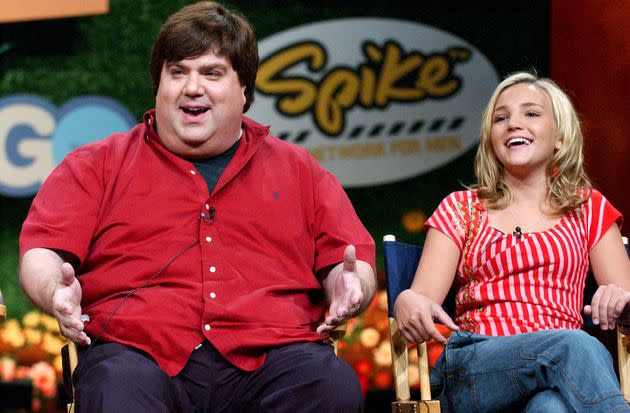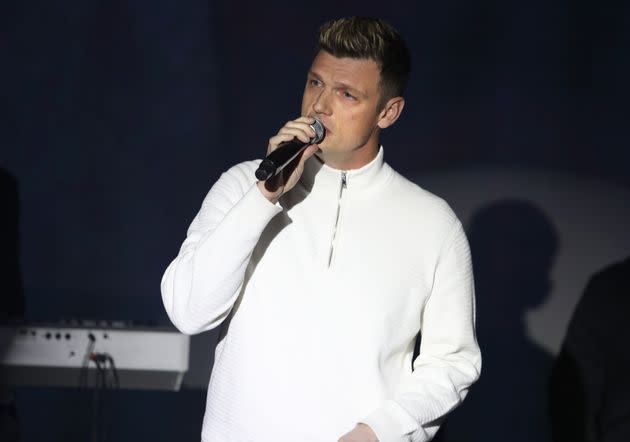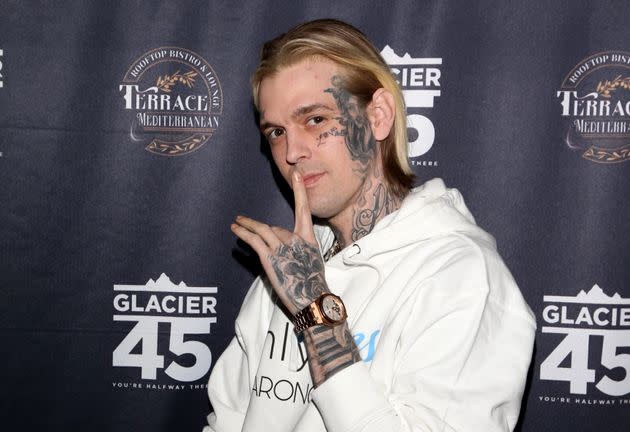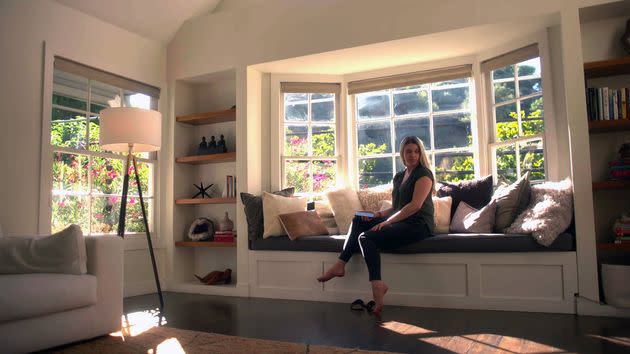Investigation Discovery Has Helped Usher In A Questionable New Era Of Tabloid TV

It’s never good when the disturbing and urgent subject matter of your docuseries takes a back seat to the increasingly equivocal way it’s packaged. But Investigation Discovery, which recently brought us “Quiet on Set: The Dark Side of Kids TV,” is now two for two in that regard.
“Fallen Idols: Nick and Aaron Carter” largely examines allegations of sexual assault that three women made against Backstreet Boys singer Nick Carter beginning in 2017. But the series leaves the viewer with more pressing questions about its storytelling and motivations.
Fans of the network since its origins in 2008 might be more used to its sensationalized reporting of celebrity events.
Piggybacking off the then-burgeoning success of true crime TV, ID began to make a name for itself with shows like “Wicked Attraction,” which examined real-life murderous couples, long before hits like “Joe Exotic: Tigers, Lies and Cover-Up” in 2020.
The network’s success was brought on by a number of things: more people staying at home and watching television in the thick of the pandemic; a greater investment in a 24-hour news cycle that lends itself to an interest in true crime; and our own celebrity obsession.
Combine those last two things, and you get to where we are with the state of the form today. Pop culture’s insatiable hunger for celebrity news and scandal, combined with our everyday doomscrolling ritual, has helped popularize a new golden era of tabloid television reminiscent of sensational, journalism-adjacent hits like “Hard Copy” and “A Current Affair” in the ’80s and ’90s.

Today, though, the audience is able to immediately and visibly contend with the question of which details are presented in the series, and how. That chatter on social platforms, which by nature are often hostile to context and friendly to misinformation, can contribute more to a series’ success than the actual nature of the program itself.
We saw that happen after “Quiet on Set” aired in March. It adapts much of the reporting from Kate Taylor’s thorough 2022 Business Insider investigative article citing allegations of toxic behavior and sexual assault at Nickelodeon in the early ’00s. But viewers’ engagement turned to questions about the ways in which the documentarians portrayed the information.
In April, interviewee Marc Summers, host of Nickelodeon’s “Double Dare,” alleged that he’d been “ambushed” by the filmmakers, who he said “never told me what this documentary was really about.” (Directors Mary Robertson and Emma Schwartz later stated that they “are clear with each participant about the nature of our projects.”)
What actually happened there? Well, it depends on who you choose to believe, which is a helluva thing when at the center of all this ― or, maybe, in the background ― are serious allegations that only attained visibility in the era of #MeToo and the climate of believing alleged victims.
That same month, Raquel Lee Bolleau, a former child star of the network and another interviewee in the series, expressed on her TikTok that she also wasn’t aware of what “Quiet on Set” was about until it aired. “After watching the show, I saw that it was not at all what I signed up for,” the actor told IndieWire.

Despite all the fallout of the series, it became ID’s most watched title ever, with 1.25 billion viewing minutes. That might say a lot about the audience’s FOMO or morbid curiosity about a docuseries that has sparked so much controversy ― among both its own participants and an increasingly skeptical public. Or it might speak to people’s genuine interest in the allegations and alleged victims.
But there’s another part of the blowback that lingers.
Bolleau and Alexa Nikolas, another interviewee and former child star, both alleged that they hadn’t known the series was for Investigation Discovery until shortly before it aired. “When I looked it up,” Nikolas told IndieWire, “my first thought was our stories and the conversation that deserves to be had around them are way bigger than ID and deserve a more credible platform. A more serious one.”
That’s the energy audiences are coming into as ID’s new celebrity docuseries, “Fallen Idols,” airs this week. There’s an overwhelming and miserable inclination to dispute how certain details of the four-episode series, from directors Tara Malone and Natasha Bowler, are laid out, because of the concerns raised from the network’s previous offering.
Does ID have a credibility issue? If so, that doesn’t seem to have slowed it down. Just earlier this month, the network aired a docuseries exploring new sexual assault allegations against Kevin Spacey in “Spacey Unmasked.” (The actor denied the allegations.) With “Fallen Idols,” ID is attempting to do a similar type of celebrity scrutiny.
Audiences are informed in “Fallen Idols” that Nick, 44, declined to be interviewed for the series, that he denies each claim and that he’s filed countersuits against each accuser. The series also directs viewers to extensive documents that support his position, provided by his attorneys, at fallenidolsdocumentary.com.

The docuseries also takes a deeper dive into the troubled relationship between Nick and his younger brother Aaron, who died in 2022 at the age of 34, as well as their wider family. Nick’s sisters Leslie and Bobbie Jean both died following complications with substance misuse ― Lesie in 2012 at age 25, Bobbie Jean this past December at 41 ― as did Aaron, who was open about his mental health struggles.
Similar to the 2022 Discovery+ production “House of Hammer,” another salacious celebrity true crime series, “Fallen Idols” interviews family members of its subjects (actually, just one — a cousin named John Spaulding) and people who claim to be close to them, as well as the alleged victims and psychologists.
Also interviewed are family members of the alleged victims, and journalists including Scaachi Koul, who was also interviewed in “Quiet on Set.” (Koul was formerly a writer for the now-defunct BuzzFeed News, which shared a parent company, BuzzFeed, Inc., with HuffPost.) Moving beyond the nature of the sexual assault allegations, “Fallen Idols” pulls back layer after layer of sordid details including allegations that Jane Schneck, Nick and Aaron’s mother, drew a wedge between her two performer sons.
Melissa Schuman, an alleged sexual assault victim, offers speculation that Nick’s filing of a restraining order against Aaron in 2019 ― allegedly because Aaron threatened to murder Nick’s wife ― was actually due to Aaron’s initial public support of Schuman. Nick’s ex-girlfriend Kaya Jones, who is also interviewed, disputes this claim. Aaron also later recanted his support for Schuman.
Complete with archival video of the two brothers, both together and separately in their own lives and careers, “Fallen Idols” is packed with unsettling and sometimes painful details within a larger story that ostensibly paints a deeply unflattering portrait of Nick, at best.

All of that, though, is couched inside a progressively muddled docuseries that includes interviews with self-proclaimed Backstreet Boys superfans as Nick’s predominant sources of support.
Accounts from the alleged victims are also complicated by flip-flopping details. For example, Ashley Repp, who alleges she was 15 when Nick assaulted her, told police that she told the singer she was 18. Shannon Ruth also made conflicting statements about her encounter with Nick.
The unfortunate circumstances surrounding their cases are rarely challenged and only lightly supported in the series by psychologists interviewed, including one who admits she has not treated one of the alleged victims but explains that memories of trauma victims can shift. (Repp also suggests that her words were twisted in her original police report.)
That helps create an icky, he-said/she-said approach (and, at times, she-said/she-said and he-said/he-said) for “Fallen Idols” audiences that compromises what the series is trying to do ― if what it’s trying to do is to build a strong case against Nick. None of that does the alleged victims any favors, making it an uncomfortable viewing experience.
If there is an overarching theme that “Fallen Idols” aims to convey, it has to do with the insidious celebrity culture that has been embedded in our psyches for decades, long before Backstreet Boys’ meteoric rise in 1996 with their debut album.

“Sometimes you can idolize somebody until it’s unhealthy for them,” former MTV VJ Dave Holmes, also interviewed in “Fallen Idols,” says. “We objectify these people, and we’re all complicit in this machine that our attention fed and fueled.”
It’s hard to argue with that message, which could serve as the foundation of a different, genuinely great docuseries that expands beyond the Carters to a wider scope of alleged celebrity abusers. But how does that theme help achieve justice for the alleged victims who are already stepping into vulnerable spaces by coming forward in “Fallen Idols”?
The slippery docuseries seems unclear on what it’s trying to accomplish, beyond possibly becoming the next source of debate and dialogue across social media. What, then, is the line between exploitation of alleged victims and fodder for the audience?
Truly great docuseries — 2019’s “Surviving R. Kelly” and “Lorena” both come to mind — have been able to navigate that question. “Fallen Idols” does not seem to know how.
“Fallen Idols: Nick and Aaron Carter” premieres across two nights on Monday, May 27, and Tuesday, May 28, from 9 to 11 p.m. EST/PST on ID and streaming on Max.
Need help? Visit RAINN’s National Sexual Assault Online Hotline or the National Sexual Violence Resource Center’s website.
Need help with substance use disorder or mental health issues? In the U.S., call 800-662-HELP (4357) for the SAMHSA National Helpline.

